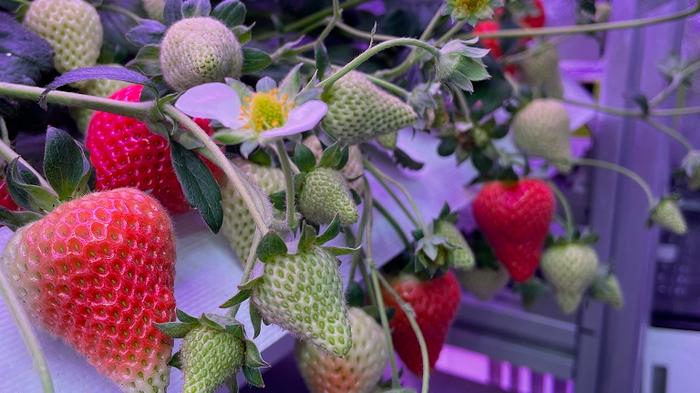Knowledge Exchange Key: New Research Suggests Strawberry Farmers Can Boost Urban Crops
Urban strawberry farmers should seek to work with current rural crop producers to exchange knowledge and help develop local self-sufficiency, new research from Harper Adams University suggests.
The research – which was published this week – has been drawn together by three Harper Adams researchers and a vertical farming technology and data company based in London.
It seeks to examine both the opportunities that new urban farming systems can present – and the challenges they currently face.
PhD Student in Indoor Strawberry Production at Harper Adams and Scientist at Vertical Future, Katia Zacharaki, said: “In the pioneering landscape of urban horticulture (UH), the cultivation of strawberries appears to be exciting due to environmental and year-round fruit availability, yet it is also a challenging endeavour for new urban farmers and businesses.
As demands for locally produced food escalate, the integration of strawberries into revolutionary urban growing systems becomes imperative.”
Throughout their paper, the researchers worked to address the pressing challenges faced by urban growers in incorporating strawberries into their portfolio of crops, emphasising the crucial need for knowledge exchange between established commercial rural producers and the newer, urban farmers.
Katia added: “While we need to appreciate that there are idiosyncrasies in all urban growing systems, ranging from outdoor soil-based systems -such as allotments and community gardens – to indoor soil-less ones like those used in vertical farming, we need to accept the baseline plant cultivations methods are well researched and established for commercial growing applications.
Commercial producers have extensive experience in all aspects of plant physiology, environmental conditions, pest management, irrigation, nutrient feed, and pollination, which makes them valuable stakeholders that have to be consulted by urban newcomers.”
The team have worked closely alongside industry partners in developing their research, including Vertical Future, a global vertical farming and data technology company whose Chief Scientific Officer Dr Jennifer Bromley co-authored the paper alongside Katia, Professor Jim Monaghan, and Dr Laura Vickers.
Dr Jennifer Bromley said: “Our work at Vertical Future in developing technologies for strawberry plant propagation and fruit production has shown how much knowledge there is in the sector which we can translate into technological solutions to improve processes for urban horticulture as well as supporting current growers with technological solutions to known challenges.”
Katia added: “By bridging the gap between experience producers and newcomers, this review envisions a future where urban strawberry fields contribute to sustainable farming, ensuring year-round fruit availability, local self-sufficiency, and fostering a sense of community in hyper-local spaces.”

